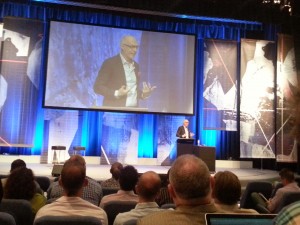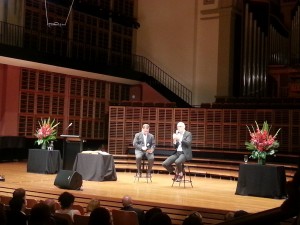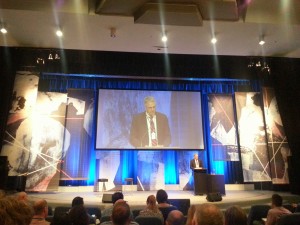Re:Thinking a Public Faith Conference (Day 1) #rethinking2014
I’m at this conference. It’s in Sydney. My wife is with me. It is a Good week.
The conference is co-organised by the Centre for Public Christianity (CPX), and the Arrow Leadership program, of which I am an alumnus. The title of the conference is self-explanatory. The keynote speaker is Miroslav Volf.
As with other conferences I attend, in order to gather my thoughts at the end of each day, I shall blog about them. Nothing in depth, more of a brain-dump.
SPEAKER#1 – WELCOME TO COUNTRY
When it comes to “welcome to country” or “acknowledging traditional owners” moments at events like these I usually wince. It’s often (particular “acknowledgements”) done as a white-person’s pretentiousness rather than with any sense of meaningfulness.
This. Was. Different.
An aboriginal man welcomed us. I’m not sure who he is. But I do know that the way he welcomed was profound, inclusive, generous, and substantial. I’ll need to get the text of his welcome at some point.

SPEAKER #2 – MIROSLAV VOLF
Morning at Wesley Centre / Evening at Conservatorium
First impressions: I must admit that Miroslav is something of an unknown to me. I have not read any of his material intentionally (although that will probably change now). He is obviously an academic: thoughtful, precise in his language, careful with his words. He spoke much like someone like Alister McGrath writes, not without opinion, but with care to ensure that we all know that he has listened to all arguments and has weighed them. Miroslav speaks well but is wordy. A diagram or three, an explanation of terms, especially when he uses them in a particular way or a manner peculiar to him, would sometimes be helpful.
He began with a little bit of backgrounding. This was useful because he explained where he was positioning himself rhetorically – not at the heart of the Christian faith, but at that point of intersection with other lives (particularly when it does so at broad scales, e.g. “globalisation”) where he speaks more about “faiths” or “religions.” For him, this forms “non-colonizing” discourse which allows him to speak “pluralistically” (more on that phrase later). It is also the shape he needs to be in to do what he does at Yale.
He unpacked the emotional aspects of that operate in this space. There is a fear of violence: from secularists of Christians, from Christians of secularists, from both of people of other faiths.
His determination, therefore, is to embrace a political pluralism. And he asserts that this does not demand a philosophical or religious pluralism. In other words, it is possible, in a public sense, to assert that the Christian faith (and Jesus himself especially) is True, without having to (politically) consign everyone else to hell.

For myself this is a quite pleasing confirmation of some of my thoughts about engaging with the world. After all, I have had a “truly pluralist secular society” as an articulated value long before I heard of Miroslav Volf (although I might now question my use of the word “secular” in there.)
And later Miroslav would go on to demonstrate how he is avoiding the problem of having a philosophical framework that incorporates Christianity but inadvertently supercedes it (e.g. when someone says that they are a Christian but all there ethics and public engagement is actually shaped by the pop-culture of humanist optimism and wanting to simply be nice to everyone). His argument is that political pluralism does not demand religious pluralism, or (in the other direction) religious exclusivism does not demand political exclusivism. And the maintenance of that distinction is actually innate to the Way of Christ.
All this was fleshed out substantially, of course:
- He talked about the motivations for conflict – competition, diffidence, and glory; gain, safety, reputation; mastery, defence, trifles – and discussed how this interacts with thought about religion. (e.g. the propensity of Christians to think religion is benign, except for human nature sometimes; crf the propensity of secularists to think that religion is violent, except when tempered by human nature sometimes!)
- He suggests that the better question is not “Is Christianity violent or peaceable?” but “Under what conditions is Christianity peaceable and/or violent?” After all, Jesus declared that his ministry would not bring peace but division! The beauty of this new question is that rather than sweeping aside it provides a means of assessing truth claims (e.g. Christianity is not peaceable in the face of injustice. Why is this? How does this engage with other philosophies and the pluralistic political ecosystem as a whole.) It also encourages engagement and mutual respect.
- The avoidance of violence involves eschewing power. When political power overlaps with religion there tends to be violence. When there are religious societal boundary markers (not in the religious sense of defining a community, but in the political sense of defining who can or can not participate in society), there tends to be violence. Christ eschewed such mechanisms, yet made his truth claims well, and we can and must follow.
- He spoke of thick religion (“His story is my story and I will live it out.”) with thin religion (“an aura of the sacred that can be manipulated.”) Thickness does not avoid violence/conflict, but it does avoid them on the grounds that are often used for violence – gain, safety, reputation etc.
He finished with four points of application:
- Guard faith’s independence from political power and resist it’s employment as a marker of communal identity.
- Concentrate on faith’s vision of a life well-lived (for Christians this means Christ) – i.e. don’t thin out your faith.
- Embrace political pluralism – freedom of practice, choose, and reject different philosophies.
- Shape communal life around the Golden Rule.
In the above I have merged my thoughts from both his morning lecture and his delivery of the Richard Johnson Lecture, which covered a lot of the same ground.
 SPEAKER #2 – MARK SCOTT, Director of the Australian Broadcasting Corporation
SPEAKER #2 – MARK SCOTT, Director of the Australian Broadcasting Corporation
This will only be a short entry. Not because Mark Scott didn’t say anything. He did. And it was a fascinating insight into the media and the view of Christians from those within the media sector.
However, the bulk of Mark’s talk was a discussion of new media versus old media. It was refreshingly presented but it’s a topic that I’ve done a lot of thinking about over the years and didn’t give me much new material, although a pleasing sense of confirmation developed!
There was a significant point of overlap between the public faith discussion and this. Public faith is about communication. Your typical preacher man is definitively “old media” – one person talking to many or a non-audience driven schedule. This is often lead to a reimagining of church services, but it often feels like a program like Q&A – old media with a twitter tack-on. We shouldn’t abandon the gathering of the saints and homiletics of course, but more broadly speaking the communication of the Christian world view is still playing catch-up. And to cross that gap it requires a cultural shift which enables and empowers all Christians to speak, without simply referring to the talking head on Sunday.

In other words, it’s a discipleship issue. Which is a good segue to:
SPEAKER #3 (ELECTIVE) – GEORGE SAVVIDES
I don’t have a photo of George Savvides – but a I do have a photo taken from the room the elective was in from 1 Farrer Place.
The elective was entitled “Faith in the Market Place” but in the end it was about discipleship.
Savvides made many points but here are my take-homes which I could probably wrap-up in considering them as the Savvides understanding of “Belief.”
- Belief is known and can be embraced outside of the Christian sphere. This is basic “unknown God” stuff.
- The corporate world is thirsty for “belief.” KPI’s don’t motivate. Financials don’t motivate. Purpose and mission and valuing of people motivate. This is the stuff of “belief.” Belief slam-dunks logic every day.
- Being salt and light is not about ramming beliefs (with an s) down people’s throats, it’s about demonstrating that soft-edge unknown-God deliberations that inform our purpose, mission, and valuing of people.
This elective really got me thinking about the role of churches and pastors in helping people to be salt and light. It was not without consternation – there was a lot of talk about the secular-sacred divide and the pain of people who had been pushed towards Christian ministry as the only “real” form of ministry in the last 20 to 30 years. I was slightly incredulous that this could happen. I was also slightly consternated – after all, in the last 20 to 30 years I had chosen the “sacred” side of the equation – was I wrong, would I be able to do more for the kingdom in the marketplace? What is the role of the “sacred” in the “secular” world.
In the end, I think it’s about discipleship – not secular discipleship or some insipid form of life coaching, but “soft edges Christianity”, “unknown God” discipleship that helps Christians to express their belief (not necessarily their beliefs) in the marketplace. I heard phrases like “on Sunday, give me something to increase my depth on Monday, give me something that can be talked about with my colleagues, give me fuel for my light, give me saltiness for my life.”
It’s given me some ideas, but that’s for another time.
![]() Re:Thinking a Public Faith Conference (Day 1) #rethinking2014 by Will Briggs is licensed under a Creative Commons Attribution-NonCommercial-ShareAlike 4.0 International License.
Re:Thinking a Public Faith Conference (Day 1) #rethinking2014 by Will Briggs is licensed under a Creative Commons Attribution-NonCommercial-ShareAlike 4.0 International License.


